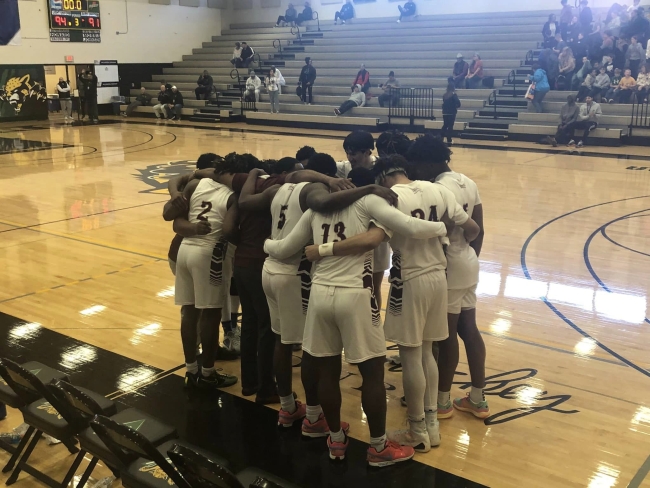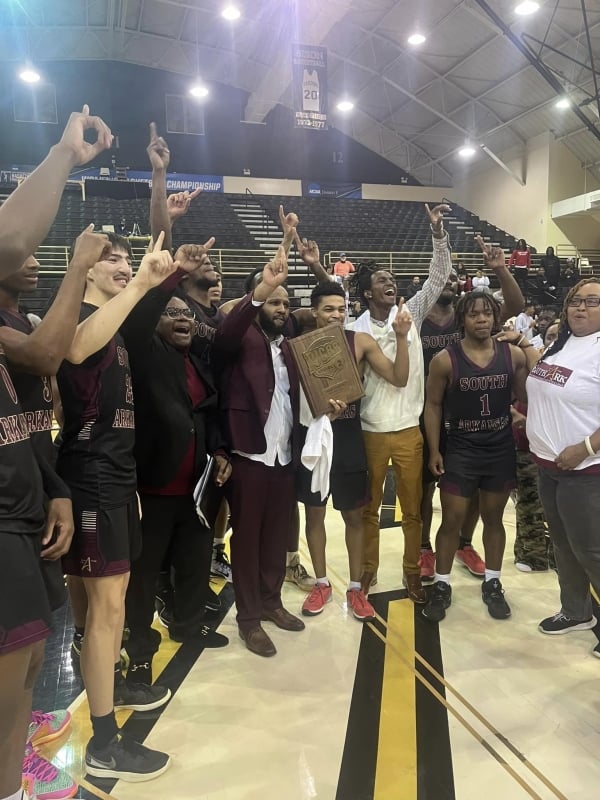You have /5 articles left.
Sign up for a free account or log in.

The men’s basketball team at South Arkansas College underwent personal and professional development training this past academic year, helping prepare them for their lives after their athletic career.
Tim Johnson, South Arkansas College
From an athletics perspective, South Arkansas College has a successful men’s basketball team. This past season, the SouthArk Stars won their district championship and advanced to the NJCAA Region II championship for the first time in program history.
But college leaders are investing in the players’ success off the court, as well, through career development initiatives.
Head coach Cameron Robinson partnered with the career services department to create a student-athlete development program, providing players with personal and professional skill building opportunities and reflection.
The program, launched in fall 2023, has helped students learn career competencies, map out their lives after college and build relationships with students and support service staff.
The background: A 2023 study on collegiate sports participation found, in general, high-visibility or revenue sports teams are more likely to include students from low-income, underrepresented minority backgrounds or from high schools with less college preparation resources.
“Football and basketball players are less likely to be on a college-bound academic track prior to college entry and are less likely to attend high schools with widely available AP courses,” according to the study. “Athletes in these sports also have slightly lower GPAs in high school than both nonathletes and nonrevenue athletes,” which in turn impacts these student athletes’ academic achievement and degree attainment later in college.
At SouthArk, Robinson wanted to help foster his team’s growth mindset beyond basketball, as well as encourage them to be engaged members of their communities. The career center staff also sought to create more internal programs and partnerships, and working with athletics helps boost student engagement and shows care from the institution, Dean of Students Tim Johnson explains.
“We saw an opportunity to expound on these offerings and co-create programming through the career center so student athletes could be prepared for the next phases of life after they transition from the two-year environment,” Johnson says.
How it works: For the first year, 13 men’s basketball players participated in the student-athlete development program, which focused on three areas: team development, student development and career development.
Through bi-weekly meetings led by the career center, students were exposed to the National Association of Colleges and Employers (NACE) career competencies and Tuckman’s Stages of Group Dynamics, encouraging them to reflect on their lives both in sports and outside of it and how that influences their experiences.
Students also completed a career assessment, discussed branding, developed their personal mission statement and created an online portfolio.
Throughout the program, the athletes participated in social and community engagement activities led by Robinson, including a community cleanup and volunteering at an elementary school to read, manage car drop-off lines and play with children during recess.
Another Model
Student athletes at Davidson College can opt into a three-day leadership and workforce development event while not in season, helping them identify future career paths, learn networking and etiquette skills, practice professional communication and engage in a mock interview.
During the first semester, the team spent equal numbers of sessions with the career center and their athletic program, and during the spring semester (when men’s basketball is in season), career center sessions were paused until after the season concluded. Athletes continued to volunteer with coaches in their community during this period.

The SouthArk men’s basketball team won the Central Plains District Championship in 2024 for the first time in program history, and participated in the NJCAA Division II Tournament this past season.
Tim Johnson, South Arkansas College
Post-season meetings with career development staff focused on creating digital portfolios.
The impact: The program went well, Johnson says. Facilitated small group conversations encouraged vulnerability among the team, invoking reflection and allowing the athletes to get to know each other on a deeper level.
Staff assessed participants through in-session assignments and demonstrations and completed a program evaluation through a mid-year survey.
Participants said they’d learned new things through the experience and had deeper reflection on concepts they hadn’t previously thought about, such as a personal mission statement.
In the future, Johnson and college leaders hope to add more athletic programs to the initiative, starting with women’s basketball, working with individual coaches to identify goals for their teams.
Do you have a career prep tip that might help others encourage student success? Tell us about it.




